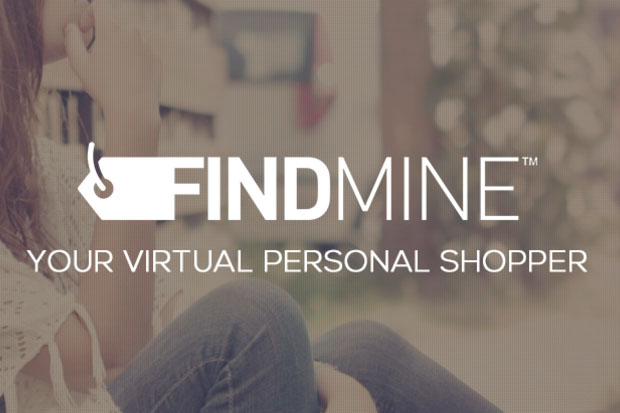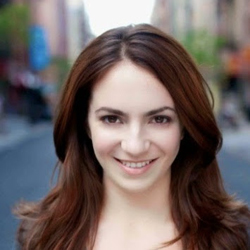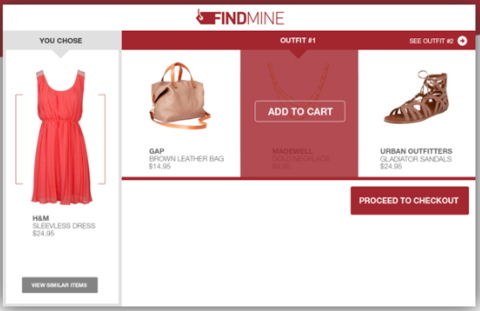Software Uses Machine Learning to Pick Out Your Clothes
Michelle Harrison Bacharach ’07 is CEO and Co-founder of FINDMINE, a technology for retailers that helps to provide product guidance and curation at scale.
Bacharach founded FINDMINE because she was frustrated with her own shopping experience. The problem is perhaps most apparent in fashion retail: You buy a new sweater, bring it home, and hang it up, only to find that the sweater stays in your closet for weeks because you’re not sure what to pair it with. The retailer who sold you the sweater online didn’t show it to you in any outfits. So you search online for images of models and Pinterest trend-setters wearing similar items, and sometimes purchase additional pieces from other retailers to complete the outfit.
 Fashionistas aren’t the only consumers impacted by product curation. Take the endcap at a grocery store. It’s Superbowl Sunday, and you’re shopping for guacamole. When you arrive at the store, you notice that someone has pulled out all the ingredients you need – the avocados, tomatoes, onions, cilantro, and limes, even the tortilla chips – and placed them in the endcap. As easy and delightful as this is for you as a shopper, it’s also manual and time-consuming for the retailer.
Fashionistas aren’t the only consumers impacted by product curation. Take the endcap at a grocery store. It’s Superbowl Sunday, and you’re shopping for guacamole. When you arrive at the store, you notice that someone has pulled out all the ingredients you need – the avocados, tomatoes, onions, cilantro, and limes, even the tortilla chips – and placed them in the endcap. As easy and delightful as this is for you as a shopper, it’s also manual and time-consuming for the retailer.
The manual and time-consuming process of product curation makes it difficult for retailers to show consumers all their products in every potential use in our lives. Imagine creating an endcap around every item in the grocery store. You’d need a fleet of workers in a space so large that time savings would be negated by the time spent wandering the massive endcap warehouse.
FINDMINE set out to solve this problem. Alongside co-founder Konstantin Itskov, Bacharach built an API to help retailers pull together products based on how humans actually use them. That means outfits in fashion, coordinated furnishings in home decor, compatible electronics, baby products, ingredients for recipes – any retail item more commonly paired with others than used alone. Using the FINDMINE software-as-a-service, retailers can provide curated product experiences with less manual work through e-commerce and email campaigns, or in stores via connected devices and the Internet of Things.
“There’s something really powerful about acknowledging to your customers that you know they’re not going to wear a sweater and nothing else. That would be crazy,” Bacharach reflected before an audience of retailers at this year’s National Retail Federation Conference.

“There’s an immutable law about human behavior in our society that we wear clothes with other clothes…But not acknowledging these immutable facts about our world is really forgetting about the human. So don’t forget the human among the things. Instead ask yourself, ‘How are customers using my product?’”
That’s what Bacharach and Itskov did with FINDMINE. FINDMINE is an API that houses information about how customers use products in real life to make customers’ lives easier. With so many industries to choose from, FINDMINE started where Bacharach had first identified the problem: fashion e-commerce.
Starting with human understanding of how and where customers use a retailer’s products, the software created multiple complete outfits around every product in the retailer’s store. The retailer saw a 40% increase in average order values – in part, because customers didn’t have to leave the site to look up how to wear their chosen items. “They’re empowered to buy more, but they’re also buying more thoughtfully.”
“After all,” Bacharach concludes, “what’s the point of the Internet of Things if it doesn’t make our lives easier?”
Berkeley Innovators sat down with Michelle to learn more about her work with FINDMINE and the impact Berkeley has had on her career:
What are you most proud of in your work with FINDMINE?
We have some amazing technology and an incredible team. But mostly I’m proud that we found a real need. Retailers spend a ton of time manually curating their products (e.g. creating outfits, sets of furniture and décor, bundling compatible electronics, etc.), so our solution offers them not only increased revenue – customers buy more when we bundle products together the way we do – but also time savings. I can hear the relief in the merchandisers voices when I share with them what we do. It’s like they’ve been stuck in the dark ages doing things manually and now we’re bringing them technology that’s truly going to transform their lives, and that makes me proud.
You’ve shared what makes your proud – addressing a real need, developing groundbreaking tech, building a solid team – but we know founding a startup can come with challenges. What’s the hardest thing about founding a startup? What keeps you up at night?
The hardest part is prioritizing and then being comfortable with and confident about those priorities. There are so many things that need to get done or could be a game-changer for your business. It’s hard not to have FOMO about not prioritizing that sales call with a customer who’s slightly outside your target, or pursuing that partnership with a bigger company, or going to this meetup or that networking event where you just might meet your next great hire or investor.
But there’s only so much that can be humanly accomplished in a day. I’ve had to work super hard at not being kept up at night by those constant swirling possibilities of what I could have done if I had just worked that extra hour, sent that extra email, skipped that dinner with friends. I achieve a herculean amount of stuff each day, and at the end, I tell myself (or my husband tells me more forcibly), “that’s enough” and then I read Good Housekeeping or watch some 30 Rock reruns and let my brain veg out!
 What role did Berkeley play in your entrepreneurial career?
What role did Berkeley play in your entrepreneurial career?
I majored in Interdisciplinary Studies, where I wrote my honors thesis on managing innovation in multinational organizations, so I studied what it takes to be an innovative organization. I had no idea what I’d do with that, but I was interested in product innovation. I got a job at a startup out of undergrad through the student job board, where a Cal alum working for a startup called BigTent had posted. She hired me to prioritize all the customer feature requests they were getting as well as run a customer feedback group where I gathered user experience feedback and ideas from our customer community. That startup had a female founder, a female CEO, and, for a while, a female head of engineering, so I had great role models in them in addition to my boss, and for the first time was able to picture myself starting a company of my own one day.
What advice would you offer Berkeley students just beginning their careers in the startup world, either as founders or as early team members?
If you can quit your idea, do it! It takes over your life seriously and you’ll miss out on so much as a student at Cal if you’re running your company full-time plus trying to squeeze in classes. But if you really can’t let go of your idea and it truly keeps you awake at night for months on end, then go for it and really dive in. Let it be all-consuming, and lean on Cal’s resources to help you learn and grow faster.
Is it better to start your own company right out of school, join an existing startup, or take a different path?
I’m glad I didn’t start my company out of school. At that time, I only had mediocre ideas. It all depends on what you want to build. If it’s a truly burning desire you just can’t say no to, then no matter the timing, now’s the time to do it. But if that’s not the case, wait until an idea truly takes hold of you before making the leap into your own thing. If you have a half-baked idea that you want to test and play around with, get a corporate job at a big company. You’ll have a better paycheck, and more sane hours, and you can test and iterate on your idea in your free time. If you don’t yet have an idea to tinker on, go work for a startup. Get the experience of what it’s like, what the grueling hours are like, get operating experience, and help build something. That’s all going to be incredible experience for you once you do start your own thing. I know a lot of investors who won’t fund teams without startup experience because it really is a different style of work that’s not for everyone.
Learn more about FINDMINE or get in touch with Michelle at findmine.us. Want to be featured on innovators.berkeley.edu? Join Michelle in making the Berkeley Founder Pledge or contact us at .
